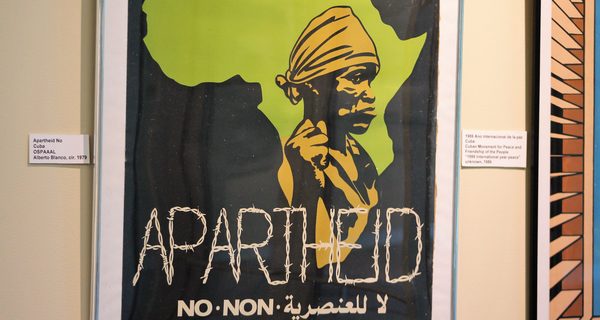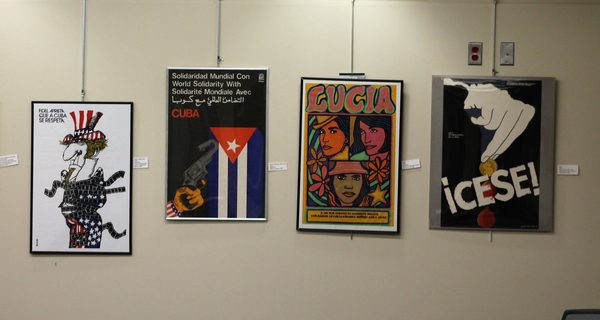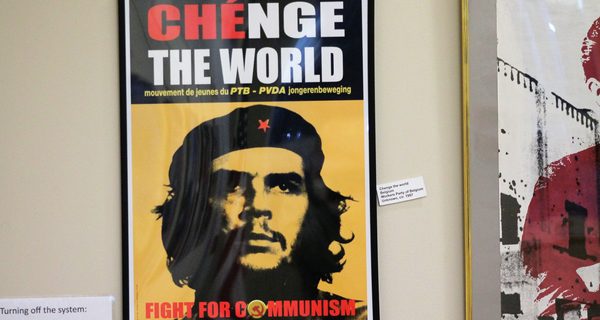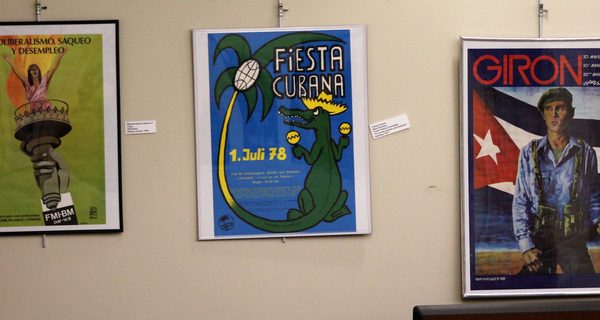Lewis noted that he appreciated both the photography based and illustrated posters, believing there to be a place for both.
By James Kinneen
Hometown Weekly Reporter
While these days your Facebook feed is likely filled with political memes, doctored photos, and stories that may not hold up when placed under some scrutinous fact checking, for decades, the primary way to express your opinion or to try and convince a person to join your cause was through a political poster.
“As commercial advertising calls for more consumption,” reads the handout Stephen Lewis provides viewers of his Cuban Political Posters exhibition at the Walpole Library, “a political poster calls for more action.”
This week, longtime labor activist and former union treasurer Stephen Lewis began displaying his collection of Cuban political posters, alongside some images of himself in Cuba and some newspaper clippings about the USA’s relationship with the island nation, inside of the Walpole Library.
Many of the posters in the collection come from the Organization of Solidarity With the Peoples of Asia, Africa, and Latin America, or OSPAAAL, which would create and send their posters around the world to be displayed internationally, thus the frequency of having multiple languages on them, many of which were stapled into copies of the magazine "Tricontinental."

Lewis has many posters that, while they may not be as collectible as the brightly colored OSPAAAL posters that he notes are often collected even by political conservatives, hold great intrinsic value to him because of how he acquired them.
Lewis, whose collection of posters now number over 9,000, had many stories of seeking posters in his travels to places like Paris, Stockholm and Amsterdam, where he found a man who had collected anti-nuclear war posters from a huge variety of different countries and was willing to share some with him. He described the experience of walking by a building and asking about the poster in their window, only for them to unpeel the Scotch tape and hand it to him soon after.
As a result of this, some of the posters have creases or the corners are ripped off. But Lewis figures that comes with the territory.
“You can’t always get pristine copies of posters that are thirty, forty, fifty years old and have maybe been hanging on wall somewhere. Or, where people haven’t taken such good care of them as I have. I’ve gotten a good number of the posters from going places in several different cities in the world. When you’re there begging for posters and someone brings you one with a coffee stain on it, I, for one, am not going to turn that down.”
It also explains why there are so many placards that show the Cuban posters being attributed to “unknown” authors. Lewis explained that’s not because a person feared retribution for making the poster, but because when he’s interrupted a workday in a labor union to ask about political posters they have lying around, in a language he doesn’t speak, it’s tough to give proper accreditation - although he does research them online and use Google Translate.
Lewis’ collection of posters is not universal, however. The political posters he collects and displays all support the issues he cares about, which tend to be progressive political actions and organized labor rights.
“The posters I collect are posters that reflect my interests in life, my history in life, and issues that I care about and have cared about. I have exhibits, for example, that are anti-apartheid posters. I was involved in the anti-apartheid movement here in Massachusetts. I even got arrested at a demonstration for it … I’ve got green politics posters about climate change, International Women’s Day, things like that. So these are all issues that I’ve been involved with, supported and participated over the years.”

Lewis said that while many people are hugely into the Russian Revolution posters, he is largely not, noting that while he appreciates the unique graphics and acknowledges the necessity of the images at a time when so many Russians were illiterate, “seeing a farmer plowing and the words say 'Part of the Five Year Plan' is not particularly inspiring today, whereas if I got a really interesting graphic poster of a demonstration against Wall Street and had it in my exhibit of 'the ninety nine percent resist,' that’s more valuable to me.”
As for personal favorites from this collection, Lewis noted that he appreciated the clever pun and iconic image of Che Guevara in “Chenge the World” from the Worker’s Party of Belgium in 1997. He also included a poster for “Lucia,” a Cuban film he believes may be his favorite movie of all time.

As for the political ramifications, Lewis noted that the libraries where his displays hang often receive complaints, but that he was only angrily confronted once while hanging them (over whether Che Guevara was a mass murderer or not). While the man was angry at first, he and the man were civil and polite, to the point that the confronter eventually invited him for a cup of coffee with friends.
It should also be noted that the posters are being displayed in two locations within the library, with the larger ones placed in the back of the library, rather than in the common room.
Regardless of how you feel about the Cuban Revolution, you should check out Lewis’ collection. As art, some of the posters are very compelling. As history, its fascinating to see what issues people were caught up in and how they countered the narrative with which they disagreed. And as practical information, at a time when it seems everybody is trying to get those “propagandists” on the opposite side of their political aisle banned from the digital space any way they can, or opting to retreat to digital bubbles where they never encounter opposing ideas, perhaps there's something to be learned from the power of a poster taped to the wall when it comes to changing minds.

























